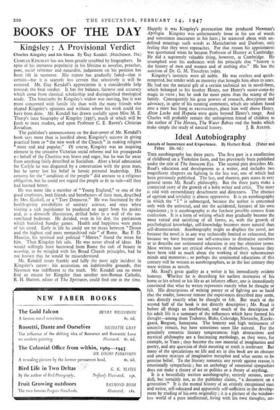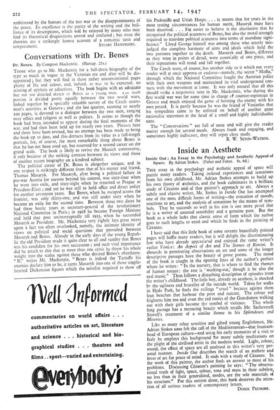Ideal Autobiography
Tuts autobiography has three parts. The first part is a recollection of childhood on a Yorkshire farm, and has previously been published under the title of The Innocent Eye. The second part describes Mr. Read's education and development as a writer, and includes two magnificent chapters on fighting in the last war, one of which had been previously published. The last, and shortest, part states in irery general terms Mr. Read's philosophy. But the three parts make a connected story of the growth of a boil.' writer and critic. The story is told with extraordinary detachment and directness. The absence of egotism and triviality is almost oppressive. It is an autobiography in which the " I " is submerged, because the author is concerned only with the universal, and not the accidental, features of his Own experience ; it is autobiography at the furthest possible remove from confession. It is a form of writing which may gradually become the most varied and satisfying of all forms, as, with the growth of psychological knowledge, self-knowledge becomes more natural than self-dramatisation. Autobiography might so displace the novel, not because the novel .is in any way technically limited or exhausted, but because we have become too self-conscious to dramatise ourselves or to describe our sentimental education in any but objective terms. Most writers now are critical observers of themselves, because they have been told so much about the working of their subconscious minds and memories ; so perhaps the sentimental educations of this century will be Written as autobiographies, as in the last century they were written as novels.
.Mr. Read's great quality as a writer is his immediately evident honesty. Whether he is describing his earliest memories of his home or his school or his life as an infantry officer, one is immediately convinced that what he writes represents exactly what he thought or felt. His desCriptions of writing poetry or of fighting are so lucid that the reader, however remote the experiences described may seem, sees directly exactly what he thought or felt. But much of the second half of the book is not directly descriptive ; Mr. Read is before all things an intellectual, and much of the description of his adult life is a summary of the influences which have formed his thought—among them Traberne Blake, Coleridge, Nietzsche, Kierke- gaard, Bergson, Santayana. Tile honesty and high seriousness of sincerity remain, but here sometimes seem like naiveté. For the genuinely romantic literary temperament high abstractions and mystical philosophy are a fascinating mythology, as they were, for example, to Yeats ; they become the raw material of imagination and poetry, and any question of their meaning or truth is irrelevant But many of the speculations on life and art in this book are an obscure and uneasy mixture of imaginative metaphor and what seems to be genuine belief. To the literary romantic any revolt against reason is emotionally sympathetic ; but an anthology of emotional sympathies does not make a theory of art or politics or a theory of anythitig., It is a beautifully written autobiography, entirely serious, never dull, but certainly not, as the publisher claims, "a document on a generation." It is the mental history -of an entirely ateptional man and writer, self-educated and apparently self-sufficient in the develop- ment by reading of his own originality ; it is a picture of the window- less world of a pure intelleaual,,living with his- own thoughts; un-
embittered by the horrors of the last war or the disappointments of the peace. Its excellence is the purity of the writing and the bril- liance of its descriptions, which will be enjoyed by many who may find its theoretical disquisitions unreal and confused ; but even the theories are a strikingly honest account of a romantic taste and temperament. STUART HAMPSHIRE.



































 Previous page
Previous page